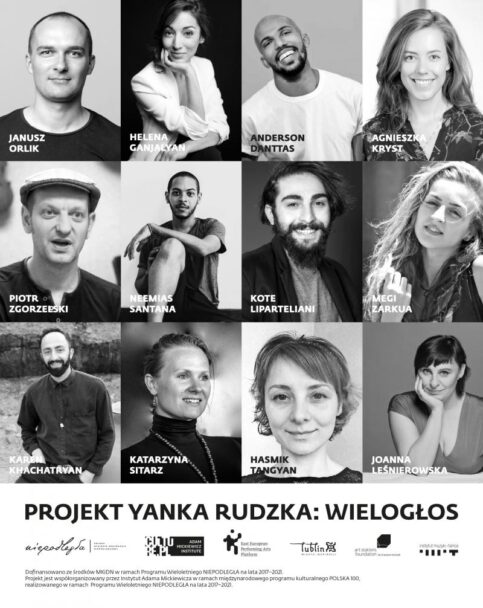
Poster project: Michał Łuczak
On 8-9 September (Saturday-Sunday, 7 pm), the Art Stations Foundation Poznań and the Old Brewery New Dance programme in collaboration with the Institute of Music and Dance in Warsaw and the East European Performing Arts Platform will host the Polish premiere of Yanka Rudzka Project: Polyphonies. The piece is a creative follow-up to the project implemented in the spring of 2016 in the Brazilian city of Salvador de Bahia in collaboration with the Vivadança Festival. It was inspired by the unexpected discovery of Yanka Rudzka (1916-2008), a Polish dancer who arrived in Salvador in 1956 to create the pioneering Dance School at the Federal University of Bahia, one of the most important performance art centres in Brazil. Yanka Rudzka, who until now has remained unknown in Poland, is considered one of the major figures of Brazilian modern dance and the first person to combine the tradition of modern dance with local Afro-Brazilian culture. Her belief that contemporary culture cannot thrive without a broad recognition of its traditional sources became the basis for Semente, a performance joining dancers from Poland and Salvador in a journey to these sources and back. We met within a dance practice stemming from the traditional, non-stylized dance cultures of the two countries: the Brazilian samba and the Polish mazurkas and obereks. At the same time, the project repeated Yanka Rudzka?s programme gesture: by confronting both our own and foreign traditions we posed questions about the significance of these traditions for contemporary choreographic practice.
This time, Yanka Rudzka guides us to the East, to Caucasus, and inspires us to propose an exciting meeting at an intersection of four cultures ? Polish, Brazilian, Armenian and Georgian. This time especially the musical concept of polyphony becomes an inspiration for a performance co-created by artists of all 4 countries. Polyphony, as an interesting metaphor for our identity ? which can be cultural, as well as national, personal and artistic, and which is polyphonic in the sense that it is constructed from many layers and often conflicting elements ? leads us to the idea of the polyphonic body. A body which contains many voices, both individual and borrowed from contemporary and traditional culture, and a body which struggles with the excess of these voices, the noise, the cacophony. It also leads us to the idea of the polyphonic composition of movement ? the ?melody? of dance composed by many different bodies (voices) united in constant motion.
A thorough, multilevel analysis of the global traditional dance culture equips us with the tools and courage required to juxtapose such seemingly distant worlds of dance as the Brazilian samba, Polish oberek, Armenian kochari and Georgian perchuli. We believe that choreography is a unique form of art which due to its multiculturalism and models of cooperation offers ready-made scripts for ?being together,? for a community based on mutual respect for different traditions and a shared system of values. With this performance we hope to cultivate this polyphonic community, by giving ourselves over to the unifying, ecstatic and transforming power of dance.
(Creators)
We meet in the practice and we practice the meeting.
Stepping on the ancestors? shoulders,
we delve into the present
and transform the future.
Idea: Joanna Leśnierowska
Composition: Joanna Leśnierowska & Janusz Orlik in collaboration with dancers
Dance: Anderson Danttas, Helena Ganjalyan, Karen Khachatryan, Agnieszka Kryst, Kote Liparteliani, Janusz Orlik, Neemias Santana, Katarzyna Sitarz, Hasmik Tangyan, Megi Zarkua
substantive support and training: Piotr Zgorzelski (Polish traditional dances), Artavazd Ayvazyan (Armenian dances),Soso Kopaleishvili Georgian dances)and Katarzyna Sitarz (work with voice) /
dramaturgy and light: Joanna Leśnierowska
soundscape: Janusz Orlik
visuals: Michał Łuczak
technical realisation Łukasz Kędzierski
coordination: Harutyun Alpetyan (Armenia) and Salome Sordia (Georgia)
production Marta Harasimowicz and Mikołaj Maciejewski /Art Stations Foundation by Grażyna Kulczyk/ in collaboration with the Institute of Music and Dance in Warsaw and the East European Performing Arts Platform.
The project is part of the international cultural programme POLSKA 100, which is coordinated by the Adam Mickiewicz Institute and realized within the international cultural programme POLSKA 100. Financed by the Ministry of Culture and National Heritage of the Republic of Poland as part of the multiannual programme NIEPODLEGŁA 2017?2021.